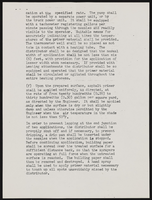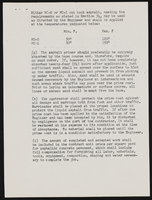Search the Special Collections and Archives Portal
Search Results
Gilbert Buck Papers
Identifier
Abstract
The Gilbert Buck Papers (1930-1986) focus on Buck's work as a surveyor and real estate broker in southern and central Nevada. Included are master reports, designs, standards, flood and drainage reports, and land specifications on water, sewer, and public lands. Papers regarding real estate include reports, housing and mobile home development plans, newsletters, surveys, and Buck Realty negotiations. There are books and information on seminars Gilbert Buck hosted in Las Vegas, Nevada on investing in raw land. Also included are awards, correspondence, newsletters, a scrapbook of Buck's early life, and information on his campaign for governor of the state of Nevada in 1974. There is include some documentation of Buck's real estate and mining interests in South America.
Archival Collection
Human Radiation Experiments Records
Identifier
Abstract
The Human Radiation Experiments Records (1949-1995) contain reports from the National Environmental Policy Act (NEPA), the Advisory Committee on Human Radiation Experiments (ACHRE), and the U. S. Department of Energy (DOE). Also included are newspaper clippings, a court case brought by the National Association of Radiation Survivors (NARS), and cancer research papers. With the goal of building an atomic bomb using plutonium extracted from uranium, the material also examines the outcomes of radiation exposure done on humans during the late 1940s and early 1950s at the Oak Ridge Nuclear Facility in Tennessee.
Archival Collection
Steven Hart Papers
Identifier
Abstract
Papers are comprised of photographs, newspaper clippings, and correspondence dating from the 1950s to the 1980s collected by Steven Hart, son of the Las Vegas, Nevada chef, Nat Hart. The papers include information about Steven Hart's childhood and his service in Vietnam. Also included in the collection are photos of Steven Hart's father, Nat Hart.
Archival Collection
Kendall Stagg Collection
Identifier
Abstract
The Kendall Stagg Collection (1998-2000) consists of material documenting Kendall Stagg’s political races in northern Nevada and also details gay activism in Reno. The collection consists of Stagg campaign materials, a t-shirt from one of his campaigns, and documents pertaining to the Gay, Lesbian, and Bisexual Student Union at the University of Nevada, Reno and Gay Pride parade organizing in Reno.
Archival Collection
Johnny Eshow Haig Papers
Identifier
Abstract
The Johnny Eshow Haig Papers (1970-1990) are comprised of contracts, agreements, and correspondence of musician Johnny Haig, who worked as a trombone player and conductor at various hotels in Las Vegas, Nevada from 1955 until 2000. Additionally, the papers house extensive original music scores written by Haig. The papers primarily cover Haig’s later career in the 1970s and 1980s.
Archival Collection
Stardust Hotel and Desert Inn Hotel Photographic Negatives
Identifier
Abstract
The Stardust Hotel and Desert Inn Hotel Photographic Negatives collection consists of black-and-white photographic negatives depicting the Stardust and Desert Inn hotels from approximately 1962 to 1967. The images depict annual and one-time events held at both hotels, including sporting events such as golf and tennis, fashion shows and beauty contests, weddings, and conventions for local and national associations. A significant amount of the collection documents the long running
Archival Collection

Transcript of interview with Lyn Robinson by Barbara Tabach, September 18, 2014
Date
Archival Collection
Description
One day in 2012, UNLV student Lyn Robinson spied a posting on the bulletin board for a photographer for the Sperling Kronberg Mack Holocaust Resource Center. She was an art major with a concentration on photography. She was also had a deep appreciation of the horror of the Holocaust and what the survivors she would take photos of had endured. Thus began a two year project, during which she took photos of over sixty survivors. Her images are preserved at UNLV Special Collections & Archives. Prints are displayed at the Sperling Kronberg Mack Holocaust Resource Center. On September 18, 2014, Lyn shared her work for this oral history recording. She is a native of Florida, daughter of a horticulturist father and pianist mother.
Text



